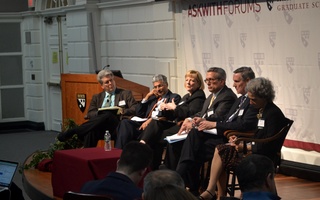When he arrived at Harvard his freshman year, Alexander E. Johnson ’10 says he thought to himself, “This is a very irreligious place.”
A native of Houston and longtime member of the city’s 8000-strong, traditionally-black Wheeler Avenue Baptist Church, Johnson was raised in a highly religious African-American family. Growing up, he would spend at least three days a week at church, attending choir rehearsals, Bible studies, and oftentimes daylong series of services on Sundays.
So when Johnson arrived in Cambridge, he says he was struck by what he believed to be the relative lack of religious organizations. While students were open to talking about everything from physics to French literature, he felt religion was not on the discussion agenda.
While he didn’t join a Christian group on account of being “skeptical about everything,” he began provoking fellow residents of Wigglesworth Hall to engage in religious conversations. His second semester, he joined SoulFood Ministry, a black Christian organization on campus, after having dinner with its members in Annenberg Hall.
Now, Johnson is a certified minister, and he preaches on the second Sunday of every month at the Western Avenue Baptist Church, an African-American church that’s about an eight minute walk from Mather House. His services regularly draw a crowd of black Harvard Christians, he said.
For many minority Christian students, religious organizations that provide a core of shared cultural values imbue their members with a level of comfort that allows them to explore their faiths.
CREATING COMMUNITY
Some Asian Christians on campus say race-specific organizations such as the Harvard-Radcliffe Asian American Christian Fellowship engender a sense of community and solidarity.
Elizabeth P. Shen ’10, the daughter of Protestant immigrants from China, is on the executive board of the AACF. Coming from an Asian community in Southern California, Shen says that there are values shared by her Chinese culture and her Christian beliefs.
“I think to some extent, work ethic and hard work could be considered that,” she says. “I think that in a sense, the idea of working hard, getting what you deserve, and good deeds are values that are based in, at least in China, very much based in family values.”
Due to the Chinese government’s limits on religion, there are few Christians who are from mainland China, Shen says. Most Asian Christians at Harvard, she says, are Korean.
Grace I. Kim ’10, raised in the borough of Queens in New York City, is a Korean Christian. She comes from a family that attends church services every Sunday and that has a verse from Thessalonians written in Korean in their dining room.
Going to a Korean church at home contributed to her being more comfortable becoming a part of AACF than the multi-ethnic Harvard-Radcliffe Christian Fellowship, she says.
At Harvard, Shen says that a separate organization for Asian Christians offers more opportunities for leadership, where students can make connections more easily.
“I have an easier time making friends with people who are Asian, partly because of where I grew up but also because it’s easier for me to share similar values with other Asians,” she says. “And I think for example in any community and any organization, if you’re Asian, it might be a little bit more difficult to be as good friends with all of these Caucasians, Europeans, whatever, enough that you’re so well-tuned with that community that it’s just as easy for you to be president or whatever of a certain club or organization.”
Read more in News
After Chaos, UC Okays New LeadersRecommended Articles
-
By the Book: Fundamentalist Christians at HarvardEarly on most Friday evenings while many Harvard students are resting up for big nights of partying, a certain number
-
The Forgotten ChristiansGiven the tremendous optimism expressed by the United States at the start of the Arab Spring, it is hard to acknowledge the reality that Egyptian self-determination has come at the expense of its Christians. But the answer to this problem is not to ignore it.
-
Harvard Begins Planning for AllstonHarvard initiated an open planning process that will create a new Institutional Master Plan for the University’s development in Allston at the Harvard-Allston Task Force meeting on Tuesday.
-
Harvard-Allston Task Force Begins Discussions on Community BenefitsThe Harvard-Allston Task Force engaged in the first of a round of discussions on community benefits in Harvard’s new Institutional Master Plan for Allston development at a task force meeting Wednesday evening.
-
 Male Career Achievement Award: Christian Webster, Men's Basketball
Male Career Achievement Award: Christian Webster, Men's Basketball -
 Askwith Forum Focuses on Analysis, Improvement of Modern Education
Askwith Forum Focuses on Analysis, Improvement of Modern Education













